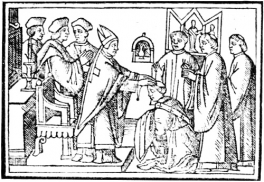 Somewhat flustered as I entered the smoky, dimly lit church of Our Saviour in Atlanta, Georgia, I knew I’d probably missed Communion. The opening mass for the yearly conference of the Society of Catholic Priests had already been going on for at least an hour, and I was keyed up from the intense traffic that is Atlanta. I was surprised, therefore, somehow to arrive right in the middle of the Agnus Dei. As the congregation sang the familiar tune, I added my voice to the mixture as I tiptoed across the floor and snagged a bulletin. It registered at this point that I was hearing predominantly low-pitched voices and looking at the backs of a whole slew of men on their knees in black cassocks, all fervently worshipping. Uh-oh, I thought. I don’t know about this. What if I’m the only woman here? What if coming to this conference was a bad idea because I’m a woman? I knew the Anglo-Catholic nature of many in the group, and I also knew there are still priests in the EC who don’t believe that women can be called as priests. As a female seminarian who (God willing and the people consenting) hopes to be a priest, I suddenly felt enormously self-conscious. Slipping into a pew near the back, I scanned the group, relieved at last to spot one or two women (one was at the altar as celebrant) as well as two male seminarians who I knew and who had come from my seminary.
Somewhat flustered as I entered the smoky, dimly lit church of Our Saviour in Atlanta, Georgia, I knew I’d probably missed Communion. The opening mass for the yearly conference of the Society of Catholic Priests had already been going on for at least an hour, and I was keyed up from the intense traffic that is Atlanta. I was surprised, therefore, somehow to arrive right in the middle of the Agnus Dei. As the congregation sang the familiar tune, I added my voice to the mixture as I tiptoed across the floor and snagged a bulletin. It registered at this point that I was hearing predominantly low-pitched voices and looking at the backs of a whole slew of men on their knees in black cassocks, all fervently worshipping. Uh-oh, I thought. I don’t know about this. What if I’m the only woman here? What if coming to this conference was a bad idea because I’m a woman? I knew the Anglo-Catholic nature of many in the group, and I also knew there are still priests in the EC who don’t believe that women can be called as priests. As a female seminarian who (God willing and the people consenting) hopes to be a priest, I suddenly felt enormously self-conscious. Slipping into a pew near the back, I scanned the group, relieved at last to spot one or two women (one was at the altar as celebrant) as well as two male seminarians who I knew and who had come from my seminary.
Much to my relief, fears related to being accepted by the group were completely unfounded. The next few days were pure joy! (And, might I add, there were many incredible women at that conference.) An introvert by nature, it’s often an academy award-winning moment when I smile, stick out my hand, and enthusiastically introduce myself. However, I found that I didn’t have to work that hard. I sat with different people throughout the conference, and although I might not have known most in the group, we found we had mutual friends and acquaintances. And if not, they often knew what I knew and love what I love. Or maybe we had similar backgrounds. Above all, we had joyful conversations about subjects about which we were all passionate. Jesus. Orthodoxy. Worship. Love. Liturgy. Formation.
Formation. Priestly formation was the topic of this year’s SCP conference, and the various speakers gave me time to reflect on this subject, one that has been discussed often here at Sewanee by me and several of my fellow seminarians. Formation is a lifelong process for all of us. It doesn’t—shouldn’t—end when one is ordained. However, as a seminarian, I have a few thoughts about formation and the importance of formation particular to seminary.
Priestly formation is something we all pay lip service to but sometimes take for granted is actually happening. Your congregation hopes that they are sending away their dear little postulants to be formed into holy priests. You hope, as a seminarian, that you are being so formed. With the three-year traditional seminary experience often truncated to a year of study, or morphed into some sort of commuter experience, or even completely transformed into online classes, formation is often up to the individual postulant or seminarian to work out for themselves. For many of us, seminary is not like a monastic community where everyone prays, lives, and works together. Being formed, then, takes intentional effort on the part of the seminary and especially the seminarian.
Before coming to seminary, I was a professional soprano and college professor. My job was not only to develop my own voice, but also to shepherd the young students in my charge in the development of their voices. Sure, I had my share of gifted young people in my studio, but one thing was the great equalizer between those who were madly, ridiculously gifted and those who were just average: following my suggestions through daily quality practice.
Now, I’m not downplaying the importance of talent. But I had some students who weren’t as gifted as others but who, day in and day out, made vocal development a priority. They did what I told them to do. They tried new ways of doing what I told them to do and figured out what worked for them. They didn’t just come to me and expect me to work miracles for them: they put their whole hearts into their lessons. They practiced as much as they could. And it paid off. There was not a discernible difference day to day. Some weeks they might actually sound worse than the week before! But over the span of four years, that daily intentional effort produced a beautiful voice. When the time came to sing insanely difficult literature for a senior recital, a voice that started out unsure, breathy, and limited in range could do truly amazing things. More gifted students who faithfully attended lessons but expected me to “work magic” on them (and there were many who thought talent alone could get them there) with very little investment on their part were soon surpassed by the less-talented, but engaged and hard-working students.
This is how any formation—including priestly formation— works. It’s not something you can see every day. It’s something you notice much farther down the line, when you are put to the test. Praying every day definitely is not always exciting. Getting up and making it to Morning Prayer is not always preferable when I could use an extra hour of sleep. Sometimes it means going to Mass when I’d rather go out to eat or use that hour to get ahead on homework or reading. But it’s those daily decisions, day in and day out, that form you. It’s daily prayer. It’s taking the option to meet with a spiritual director. It’s going to confession anyway when you’d really rather not think about your sins. It’s finding like-minded seminarians and hashing out theology together after class. And . . . it’s going to conferences like SCP!
I’m not downplaying the importance of a good seminary and good seminary professors who are there to help. Being able to pray the daily office—well, daily, with all of my peers is an enormous gift that traditional seminary offers us. The prayers, after a while, memorize themselves. You think about their words that you repeat over and over, and they sink into your soul. Praying shapes believing. And further—I know that my pastoral theology professor has been an incredibly important influence in my formation. BUT, I also think that it doesn’t work to sit back and expect the seminary to magically form me any more than a good voice lesson every week formed my students. Did the lesson help? Absolutely. Was it essential to good vocal formation? Of course. However, it was the student’s investment in the lesson—their attitude and what they did outside the lesson each and every day—that made the voice.
I’ll go even farther about this and say that if there is some aspect of this formation we are not getting but feel we should be getting, for whatever reason, that it’s up to us to pray about receiving that and promptly to seek it out. Throughout my discernment process, I’ve been amazed and humbled at God’s timing in giving me what I needed. Sometimes the need or desire was there for a while before it was met, but it always has eventually happened.
C. S. Lewis wrote in Mere Christianity: “Every time you make a choice you are turning the central part of you, the part of you that chooses, into something a little different from what it was before. And taking your life as a whole, with all your innumerable choices, all your life long you are slowly turning this central thing either into a heavenly creature or into a hellish creature: either into a creature that is in harmony with God, and with other creatures, and with itself, or else into one that is in a state of war and hatred with God, and with its fellow-creatures, and with itself. To be the one kind of creature is heaven: that is, it is joy and peace and knowledge and power. To be the other means madness, horror, idiocy, rage, impotence, and eternal loneliness. Each of us at each moment is progressing to the one state or the other.”
We have to keep making the choice to be formed well. It’s a daily choice and even a minute-by-minute one: “Each of us at each moment is progressing to one state or the other.” To my way of thinking, this means there is never a moment when we give in and say, “That’s enough formation for now!” because it is something we constantly pursue. May we always be making that choice to draw closer, to go deeper, to keep on keeping the faith.
#TractSwarm
 <a href=”http://www.thescp.org/tracts/” target=”_blank”><img border=”0″ src=”http://www.thescp.org/wp-content/uploads/2015/03/tractswarm.jpg” width=”100%” /></a>
<a href=”http://www.thescp.org/tracts/” target=”_blank”><img border=”0″ src=”http://www.thescp.org/wp-content/uploads/2015/03/tractswarm.jpg” width=”100%” /></a>
Absolutely wonderful.
m3+
LikeLike